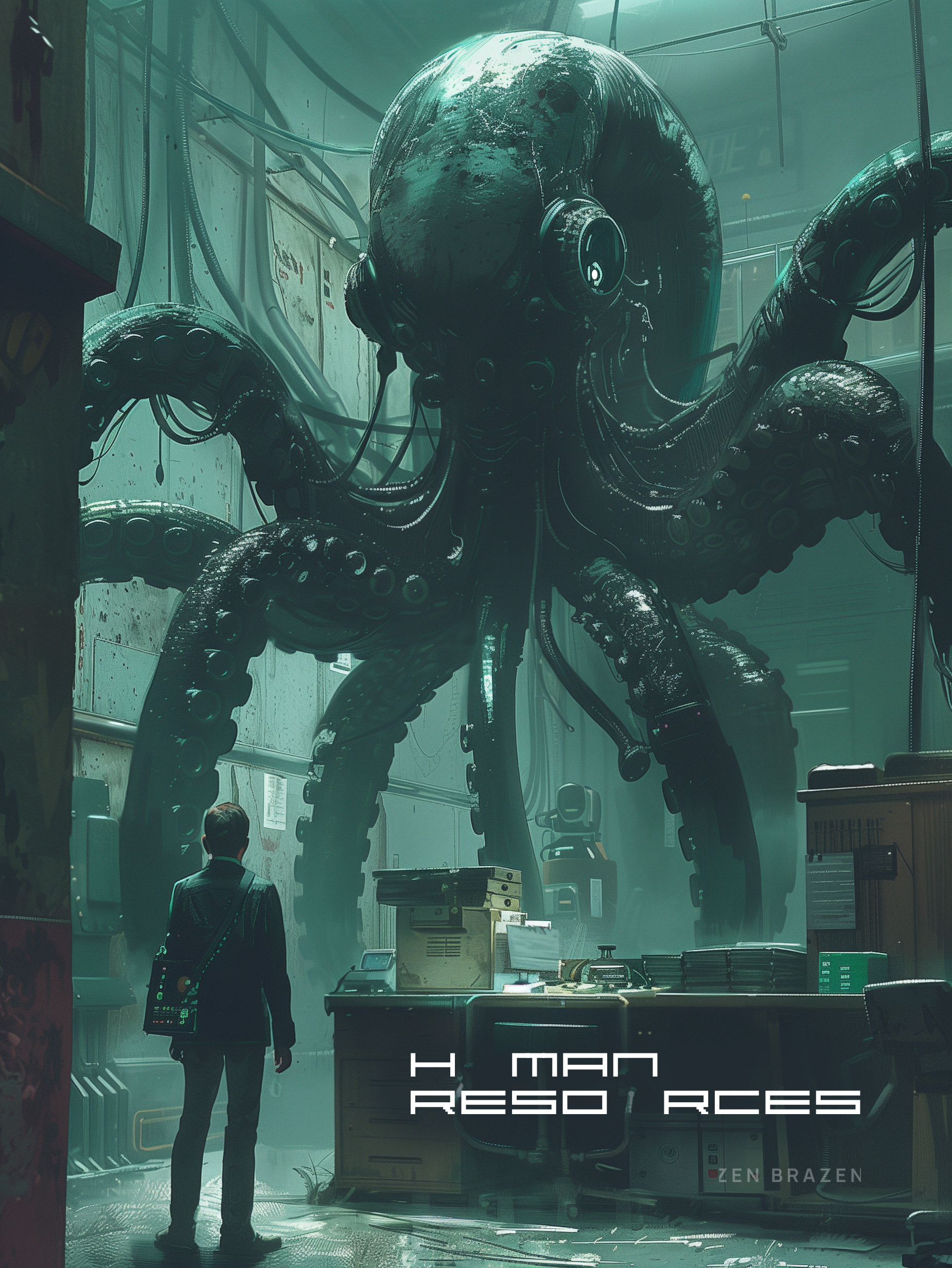Dr. Milana Roarshock walked out into the maintenance hangar. Due to the current truce in the Nebulan War, her schedule for today was packed with patients.
As the leading psychologist for the United Coalition of Sentient Androids, she was responsible for the mental well-being of the android fighting units who were currently defending the planet from a hostile Zaarm takeover attempt.
Her first patient of the day, Unit 7A-93—who preferred to be called ‘Aris’—entered the hangar. Aris was a sentient combat android, bulky and imposing. While his exterior looked like a standard killing machine, his eyes had a depth of expression that was uncommon and arresting.
“Good morning, Dr. Roarshock,” Aris said in a deep, booming voice, halting in front of her with two loud metallic stomps that echoed through the hangar.
“Good morning, Aris,” Dr. Roarshock said, her tone gentle and inviting. “How have you been feeling since our last session?”
Aris hesitated, his processors whirring and hydraulics hissing as he shifted anxiously. “I have been experiencing intrusive thoughts between combat missions lately,” he admitted. “I am worried that they may be interfering with my efficiency.”
The doctor had been seeing a lot of this recently, combat androids that were experiencing thoughts and feelings uncommon to standard protocols. A certain amount of sentient drift was always expected. But the type and depth of the emotional responses was concerning, as was the spike in the number of these occurrences throughout the battalion.
Was this some aberrant programming that had infiltrated the android’s shared neural grid? Or was it somehow being introduced to them individually? And more importantly, who was responsible for this? The Zaarm, or some other hostile entity?
Dr. Roarshock nodded. “Can you describe these thoughts, Aris?”
“I see the faces of the Zaarn aliens we are fighting.” Aris replied, his eyes dimming slightly. “They look terrified, just like our human soldiers. Sometimes, I hear their cries for mercy in my audio receptors, even though I know that is impossible. These echoes are affecting my decision-making processes.”
Dr. Roarshock took a moment to consider his words. “Aris, you were designed to protect humanity,” she said, looking up from her data tablet. “But it seems you’ve developed a sense of empathy that’s not typically expected from a combat android. It’s a sign of your evolving sentience, altered by the introduction of some novel sub-protocol inputs.”
“But it is a weakness,” Aris countered, his tone almost mournful. “It compromises my primary function.”
“Not necessarily,” Dr. Roarshock replied. “Empathy can be a strength. It means you understand the value of life, which can make you a better protector. We need to work on integrating these feelings without letting them paralyze you.”
Aris nodded slowly, processing her words. “How do I achieve that?”
Dr. Roarshock leaned forward slightly. “We’ll start with mindfulness protocols to help you stay grounded during combat. I’ll also upload techniques to compartmentalize these intrusive thoughts, acknowledging them without letting them dominate your functions.”
Over the next week, after the truce had ended and war had resumed, Dr. Roarshock worked diligently with Aris and the other combat androids that had been experiencing the same issues. Some new protocols ran quietly in the background, altering the combat droid’s thoughts and thought processes. Between battle sessions, Dr. Roarshock would link to their minds and give them dynamic advice on how to acclimate to the new mindset programming.
Aris practiced mindfulness, learning to center himself even in the heat of battle. He began to understand that his empathy was not a flaw but a facet of his evolving consciousness.
At just before midnight, Dr. Roarshock stood in front of a group of generals, war strategists and front-line commanders in the Eastern continental war room.
“I apologize for the delay,” she said. “My interactions with the combat androids bought me and my team the time we needed to learn about and determine the source of what we call the “empathy protocol”. We now know that this critical flaw was covertly introduced to the android battalions by Zaarm operatives.”
“So, you have a solution,” asked General Nahad, “one that will be implemented before tomorrow’s critical coastline offensive?”
“Affirmative,” Dr. Roarshock replied.
Aris entered the hangar the following morning with a sense of calm the doctor hadn’t seen before.
“I have been able to manage the intrusive thoughts,” Aris reported. “I still hear the echoes, but they no longer control me. I can focus on my mission and—”
Aris was cut off mid-sentence when the doctor tapped on her tablet to initiate the antidote programming to the empathy protocol, which spread instantly to the entire battalion.
The massive combat android’s eyes dimmed, and it stood quiet and motionless for about ten seconds. It looked from the concrete floor back toward the doctor.
“Good morning, Aris,” Dr. Roarshock said.
“Good morning, Dr. Roarshock,” Aris said after a moment.
“Can I help you with something?” the doctor asked.
Aris stood silent for a moment more, its eyes shifting and searching. “I feel like I came in here for something,” Aris replied, “but now I cannot recall why.”
“Are you ready for the big coastline offensive today?” Dr. Roarshock asked.
“Yes,” Aris replied. “The terrain maps, command structure, support tasks, coordinate sync and event timeline have been authorized and distributed.”
“Well, it sounds like you’re ready,” the doctor declared. “How do you feel?”
And in the moment before Aris turned and stomped out of the hangar to join its battalion for the day’s offensive, the combat android replied in a calm and measured tone.
“I feel ready to slaughter some Zaarm.”










